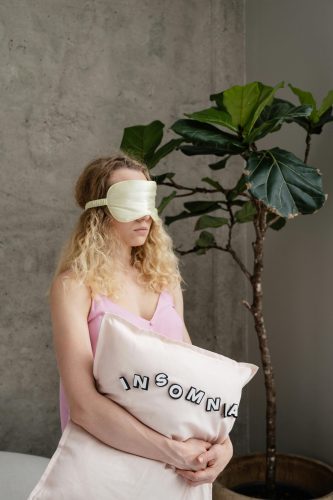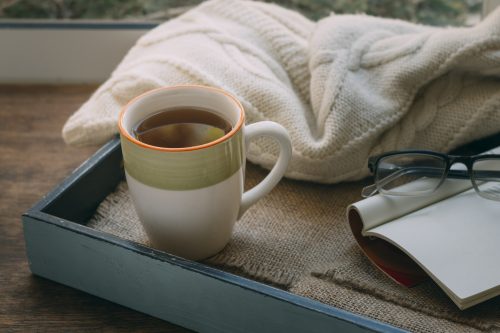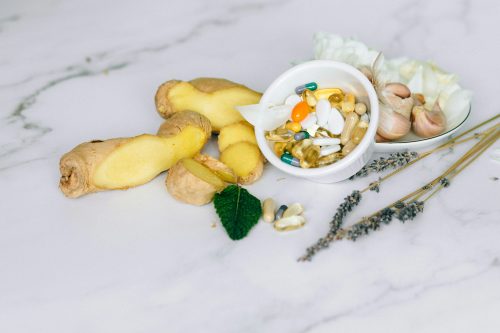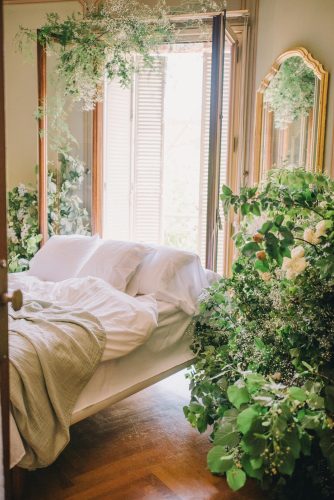Hypnic Jerks Wouldn’t Let Me Sleep
You know when you’re just drifting off to sleep and your body suddenly jerks you awake like you’ve fallen off a cliff? Classic hypnic jerk. They used to be rare for me, maybe a quick twitch if I tried to nap after a few drinks. Annoying, but not dramatic.
But then, after a particularly fun hen-do weekend (late nights, little sleep, and a few celebratory cocktails), the hypnic jerks came for my night-time sleep. And they did not let go.
What started as one harmless twitch turned into a relentless loop. Every time I started to fall asleep, I was like, here we go again… Jerk. Awake. Heart pounding. Repeat. After three nights of this, I was sleep-deprived, anxious, and honestly a bit delulu. I couldn’t relax, couldn’t sleep, and it felt like my nervous system was on red alert.
Thankfully, I spoke to a doctor who helped in the short-term (more on that below), but I knew I needed to figure out more sustainable, natural ways to calm things down. Especially with how life likes to throw us late nights, long travel, or just general stress. Now, I want to share everything I learned and what finally worked.
What Can Cause Hypnic Jerks (In My Experience)
Everyone’s body is different, but here are the biggest triggers I personally noticed:
- Alcohol. It downregulates your nervous system at first, but then rebounds hard the next day. Hello, hangxiety.
- Sleep deprivation. Whether from partying or general insomnia. Being overtired was a massive trigger, and others might experience this due to shift work or long haul flights.
- Mixing alcohol types or alcohol + caffeine (RIP espresso martinis).
- Sugar overload from cocktails. The spikes and crashes with our blood sugar messes with our nervous system.
- Anxiety. Whether you have it generally or not, I found the jerks triggered anxiety about sleeping, creating a vicious cycle.
- Stimulants like caffeine, even in tea or chocolate, especially in the evening or too close to bedtime.
- Circadian rhythm disruption. Staying up too late, long haul flights, or erratic sleep patterns seemed to confuse my internal clock and make things worse.
- Possible nutrient or vitamin deficiencies. Especially electrolytes and B vitamins, which support the nervous system.
So, why does this happen? I learned in short: our nervous systems can get overstimulated with a few or with a combination of these various factors. Sometimes I wonder wherher when our nervous systems are on high alert, even the process of falling asleep can feel “unsafe.” That’s when the brain goes, “WAIT! Are we falling?!” and jolts us awake. This is just my working theory, but it matches what I’ve experienced.
Are Hypnic Jerks Dangerous?
From what I’ve read (and been told by professionals), hypnic jerks are generally harmless. But repeated ones, especially if they stop you from sleeping night after night, can absolutely impact your health via sleep deprivation – like they did with me.
If they’re affecting your functioning or causing distress, please speak to a medical professional. I ended up having blood work done just to rule out anything else.

How I Stopped Hypnic Jerks When Falling Asleep
This part is what actually helped me, beyond the usual “cut caffeine” advice (which, yes, is part of it too).
1. The boring but necessary fix for hypnic jerks: Prioritising my sleep routine
Having a consistent bedtime, limiting screens, keeping the bedroom cool, using white noise and eye masks… all the sleep hygiene stuff actually does help. It supports your circadian rhythm so your body knows when it’s safe to relax and rest.
Do I always stick to it? No. But when I do, I sleep better and get way fewer jerks.
2. Reassuring my nervous system in the moment
This was a game changer. I get health anxiety, and when jerks were happening repeatedly, I started telling myself:
- “I am safe.”
- “It’s okay to fall asleep. My body will wake me up if anything’s wrong.”
- “I don’t need to force sleep. It will come when I truly need it.”
- And oddly enough: “Haha, thanks brain – that was dramatic.”
Humour helped break the panic cycle. It stopped being “jerk → fear → tension → another jerk” and became more like, “jerk → whatever.”
I want to add, though, if you find yourself to be a generally anxious person, it could be worth trying to speak to someone or seek therapy. Often, we find ourselves ruminating or having increased anxious thoughts before bedtime. If this is the case, you might find my blog on Journal Prompts for Overthinking helpful to get thoughts out of your mind and onto paper for some peace before bedtime.

3. Turn away from hypnic jerks: Changing sleep position
Not sure if this was placebo, but I noticed that lying halfway between my stomach and side, or not fully on my back or side, helped. Something about that angle seemed to reduce the frequency of jerks. Might be worth trying?
4. Natural Remedies for Hypnic Jerks: Magnesium
My ride-or-die. Magnesium glycinate is the recommended type of magnesium to support with sleep. I take the one you can find in this link, which is strong and super high quality (the tens of thousands of review don’t lie). It supports the nervous system and is often recommended for conditions like restless legs, which also involve sleep disturbances.
I found sometimes my abdominal muscles / breathing would contract as opposed to a traditional hypnic jerk (like a “huff” sensation) which led me to think magnesium could help if it was a muscle-spasm type situation.
Now, I take it at night to support muscle relaxation and nervous system balance. It has genuinely made a difference to my sleep, and I regret not trying it sooner.
5. Natural Remedies: Electrolytes + B Vitamins
Alcohol depletes electrolytes and B vitamins, which are crucial for your nervous system. I started drinking coconut water (a natural source of electrolytes) and making sure I was replenishing B vitamins, especially after drinking. Vita coco, which you can find in this link, is the closest I’ve ever gotten to the equivalent taste and quality of having a fresh coconut smashed open for you on a Thai beach.
6. Natural Remedies: L-theanine
This amino acid is found in green tea and is known for promoting calm. But don’t drink green tea before bed because it often contains caffeine which can worsen sleep deprivation or contribute to hypnic jerks! Just stick to the supplement form.
L-theanine can help to rebalance the nervous system by supporting our brain chemicals (neurotransmitters) after drinking, especially by supporting calm and counteracting overstimulation – which alcohol tends to ramp up after its initial depressant, sedating effects on our nervous system (like a rebound).
7. Natural Remedies: Lemon balm (and other calming herbs)
This one is more for underlying anxiety. Lemon balm (often sold as a liquid supplement) is a gentle herb with some research backing its ability to promote sleep and calm. I strongly recommend mixing it with valerian for sleep support, since research supports the mix of the two being most effective for sleep. I talk more about that in my post on grounding herbs in this link, which is a very helpful read if you’re looking for natural ways to support your mood.

8. Natural Remedies: A supplement that combines all of the above
I use Melissa Dream by New Nordic since I ran out of magnesium, especially since it is cheaper and easier than combining different supplements. It includes lemon balm (fun fact: it is also called melissa officinalis and looks like mint), magnesium, L-theanine, and B vitamins in one handy supplement.
Just a note: If you’re using a supplement like this, don’t double up on separate magnesium or B vitamins unless it matches the safe daily limits. Always check the label or consult a health professional.
9. Reducing alcohol (and sugary cocktails)
I still enjoy a drink here and there, but I’m more mindful of mixing different types and sugary cocktails that used to send my nervous system into overdrive.
10. Limiting caffeine + stimulants
This was hard (especially being a tea drinker), but I now avoid any kind of caffeine, including black tea, after the afternoon. Even green tea, unless it’s decaf. Herbal teas get the pass, though! If you’re a coffee lover like me and dread the thought of life without coffee, you have to read my blog on coffee alternatives. You don’t have to completely relinquish coffee for a restful sleep. Luckily, we live in the day and age where we have so many low-caffeine or coffee substitutes available to us.
11. When nothing else works for hypnic jerks: medical support
When the Hypnic jerks were relentless, my doctor didn’t go the sedative route. Instead, they prescribed a short course of melatonin to specifically reset my body clock. I was told it is not often prescribed in the UK (usually just for kids or older adults), but in my case, it really helped for those few tough nights.
I don’t use it often, and I never mix it with alcohol or other sedatives (like the above herbal supplements) as this can be dangerous. But it was a helpful temporary tool. Whilst not all medical professionals will take the same route, it is important for our individual situation and experiences to be evaluated if it is impacting our functioning.

Final Thoughts
Hypnic jerks can feel scary, annoying, and downright disruptive. But you’re not alone, and they’re not dangerous in most cases. What helped me was supporting my nervous system from the inside out, sticking to a steady sleep routine, and addressing my anxiety head-on.
If yours are intense or long-lasting, definitely talk to a doctor, even to rule out deficiencies or other causes.
And if you’re in the thick of it now: you will sleep again. It might not be tonight, but your body knows how to rest. We’ve got this!
Affiliate note
Some of the links on this blog may be affiliate links, which means I may earn a small commission if you choose to purchase through them – at no extra cost to you. I only recommend things I’ve personally tried and found helpful. Thank you for supporting Grownded!
